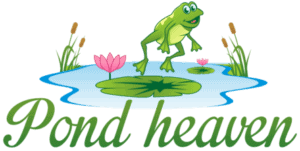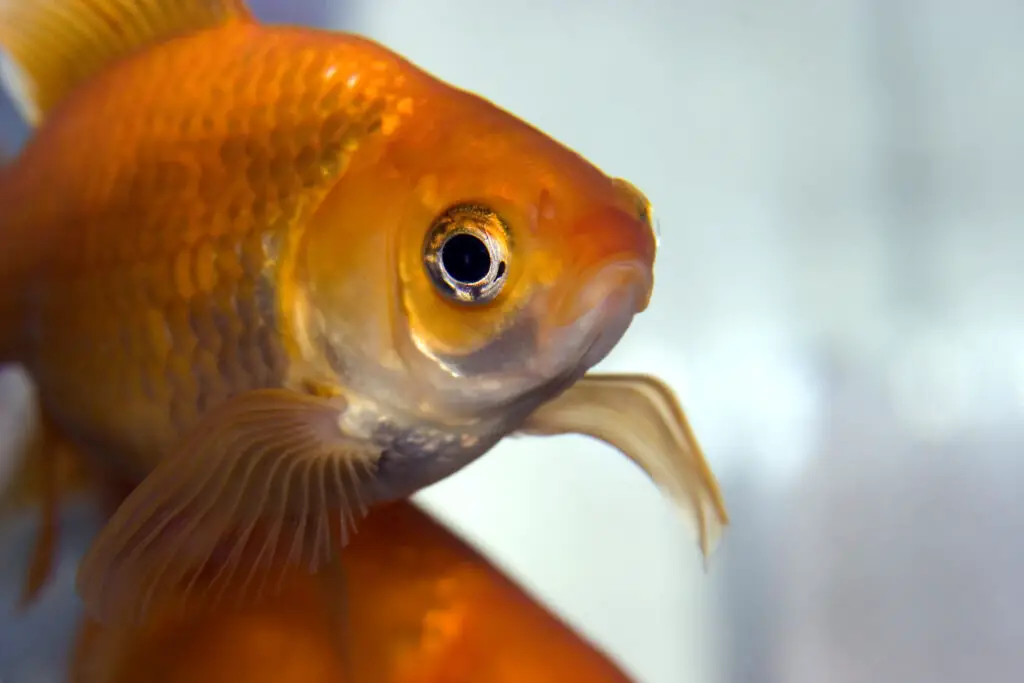
Koi and goldfish are undoubtedly two of the most recognizable fish species to most of us. Their bright, vibrant colors instantly attract attention even if you’re not a fish owner. Koi and goldfish originate from East Asia, where they have been kept as ornamental fish for centuries. The popularity of both species has spread to all parts of the world.
Although koi and goldfish may look similar, they have some distinct differences. These include:
- Origin Body shape and size
- Fins and tail shape
- Koi have barbels
- Different mouth shape
- Digestive tract
- Life expectancy
- Color variations
- Required habitat
Both koi and goldfish are popular pets due to their relatively low upkeep. Goldfish lend themselves well to being kept in smaller aquariums in built-up areas and apartments. However, the difference between these two types of fish is often not obvious to a novice’s eye. Let’s explore the main differences and learn some interesting facts about the koi and goldfish species.
Pro Tip: If you’re tired of wasting money and making costly mistakes on the koi-keeping hobby or are thinking about buying koi fish but don’t know where to start, I strongly suggest you check out this ebook. I recently read this ebook, and it contains SO much useful information, such as:
- 3 proven steps to identify koi fish diseases
- WARNING: 3 things you should NEVER do when it comes to caring for koi
- When to seek professional help when it comes to looking after your koi
The Differences Between Koi And Goldfish
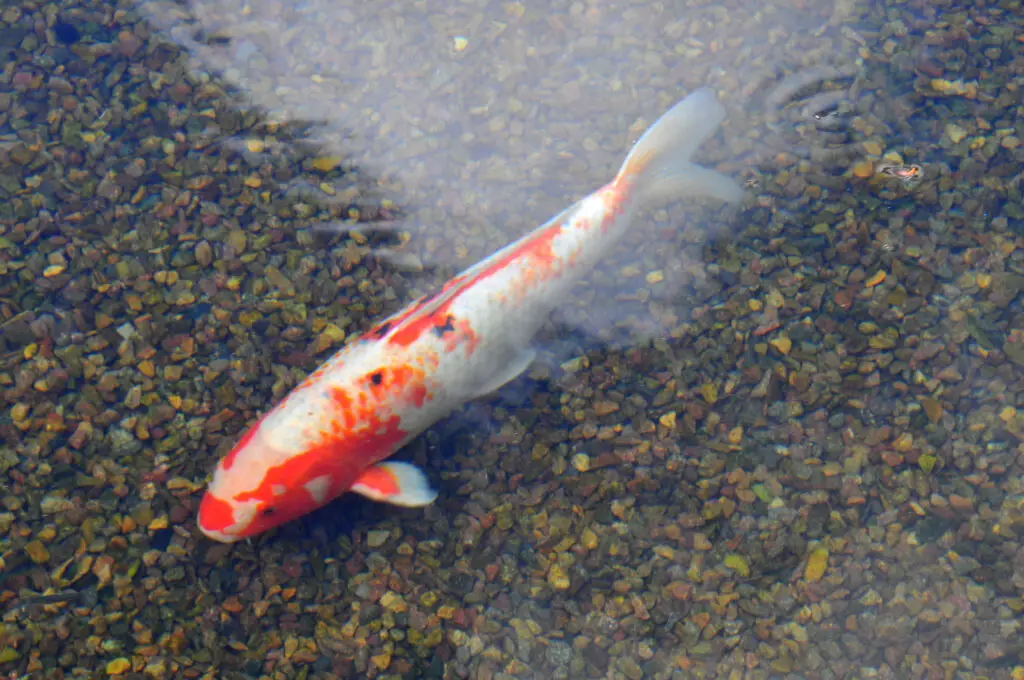
Koi and goldfish look remarkably similar when they are young and are difficult to tell apart without specifically knowing what traits differentiate them. To confuse things a little more, pet shops keep their young koi in an aquarium, usually reserved for goldfish, making identification even more difficult.
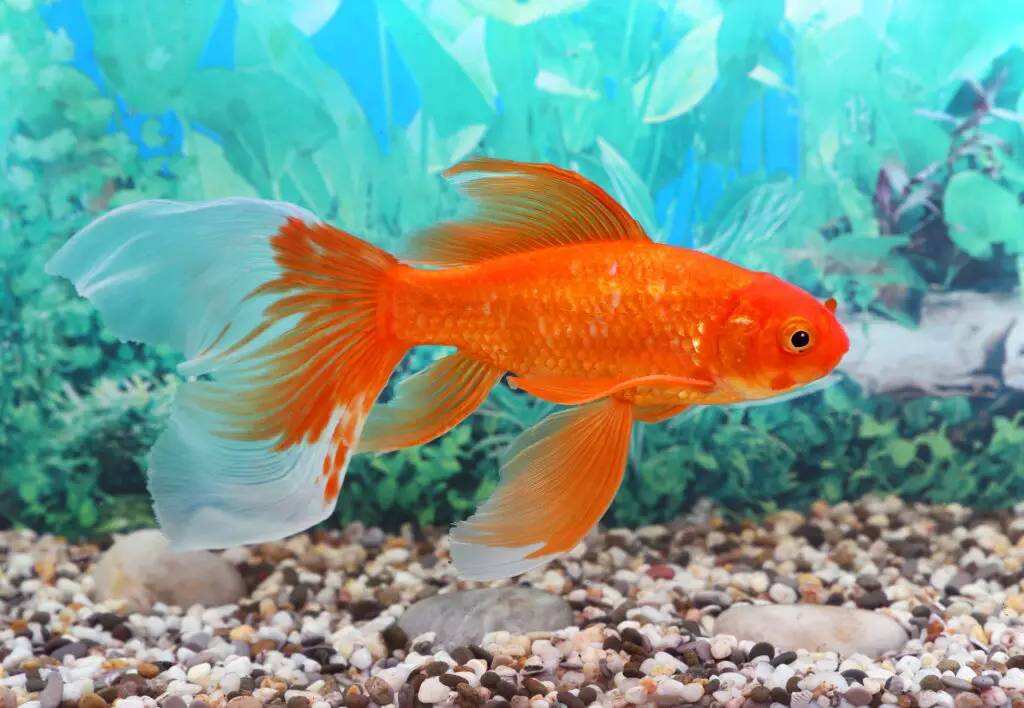
As an introduction, we have made up a quick, easy-to-read table showing the main differences between the koi and goldfish.
| Koi | Goldfish | |
| Origin | Japan | China |
| Juvenile Shape | Very similar – difficult to tell apart from a goldfish | Very similar – difficult to tell apart from a koi |
| Maximum Adult Size | Length: 4 feet / Weight 33 pounds | Max length : 6 inches Weight: 0.5 pound. |
| Common Adult Shape | Slender fish | Small heads with large bodies |
| Tails and fins | Smaller fins and tails compared to their body | Can have long flowing fins and tails |
| Dorsal fin | Curved out | Curved in |
| Barbels | Yes | No |
| Life Expectancy | 35 – 100 years | Maximum 15 years |
| Mouth Shape | Flat bottom lip | Round or circular bottom lip |
| Stomach | No stomach. Food moves directly into the intestine | Has a stomach |
| Color | Black, red, white, orange, and cream in various tones. Patches of contrasting colors are often bigger than on goldfish. | Black, red, white, orange, and combinations of these |
| Tank or Pond? | Must be kept in a pond. Young koi can be kept in indoor aquariums, but they need to be moved to a pond as they grow. | Can live in a tank or pond |
Koi originated in Japan and were bred by selecting specific traits from Amur Carp, Cyprinus Carpio, also known as common carp. The Amur carp were kept in ponds in ancient times as food. In its original form, the carp is a drab green color. Color variants in the Amur carp started the development of ornamental koi as we know them today.
Goldfish, scientifically known as Carassius auratus, originated from China and were bred from the Prussian Carp. Breeders focused their effort on bringing out various physical traits that have resulted in the multitude of shapes, colors, and sizes we know today.
Let’s look at some factors that differentiate koi and goldfish.
Difference In Body Shape
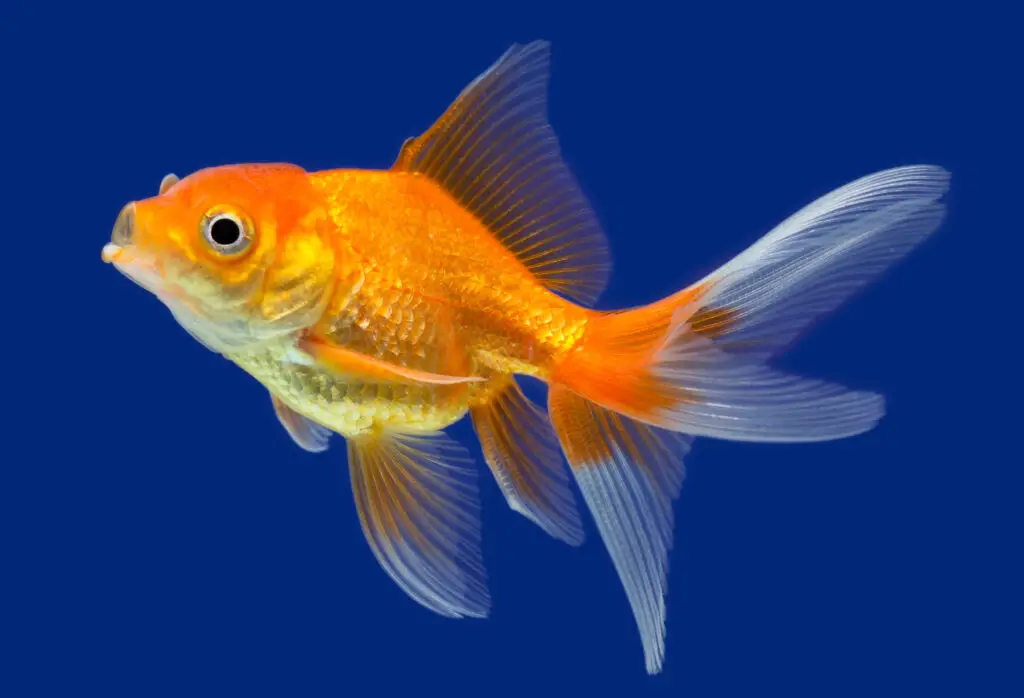
The main difference between koi and goldfish is their adult size. Koi are generally slender fish, with a significant percentage of the total body mass located ahead of the pectoral fins. Koi can grow up to four feet long and weigh up to thirty-three pounds.
Goldfish differ significantly from koi in terms of size. Goldfish seldom grow longer than six inches in length and rarely reach half a pound in weight. Unlike koi, goldfish have relatively little body mass ahead of the pectoral fins due to their small heads and large bodies.
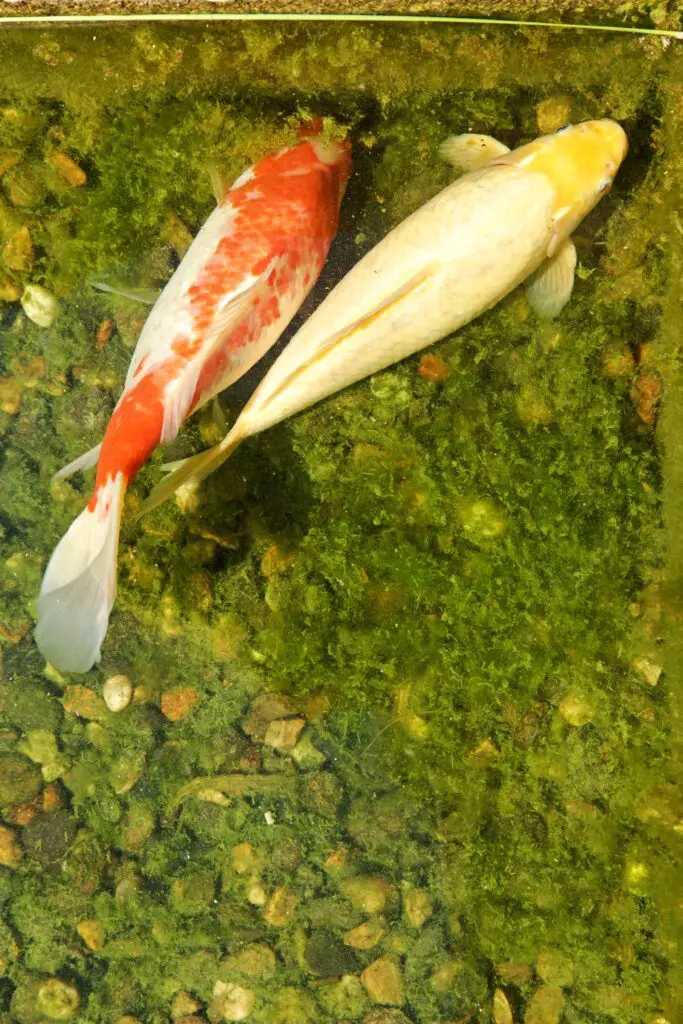
Fin and Tail Configuration Of Koi And Goldfish
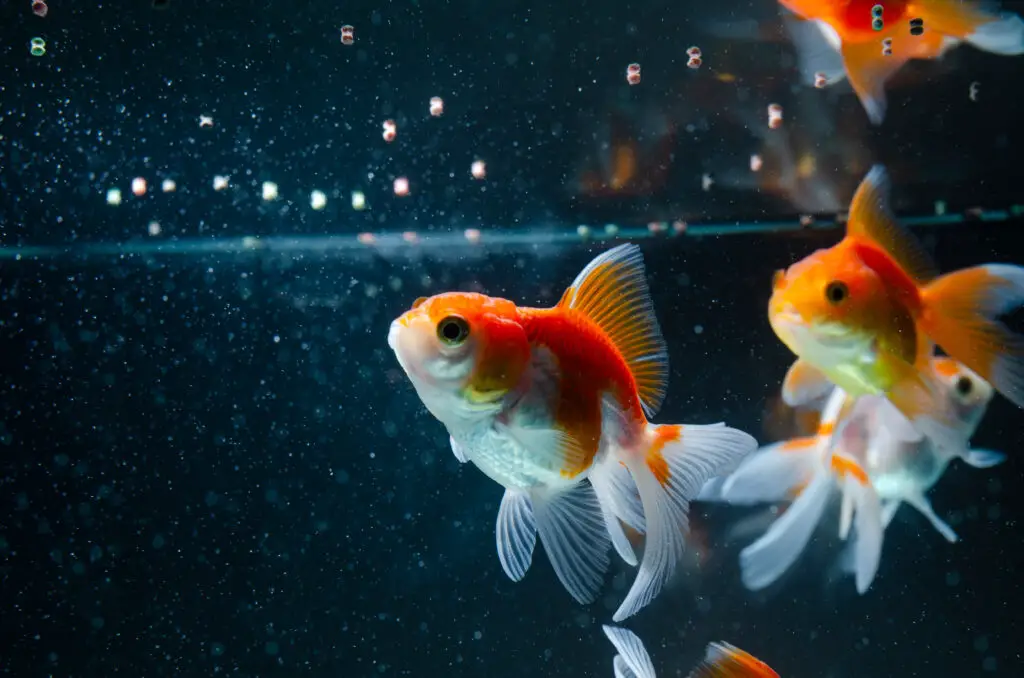
Goldfish are well known for their striking colors and often have long-flowing dorsal, pectoral, and tail fins. Koi tend to have small fins and tails compared to their body size, particularly when they reach adulthood. Koi also share fantastic coloration, often very similar to that of goldfish.
Goldfish have detached fins, which aid in identification, which means there is a distinct gap between the dorsal fin and tail. Koi have attached fins which means the dorsal fin runs all the way down the back and blends into the tail without a visible space between the dorsal fin and tail.
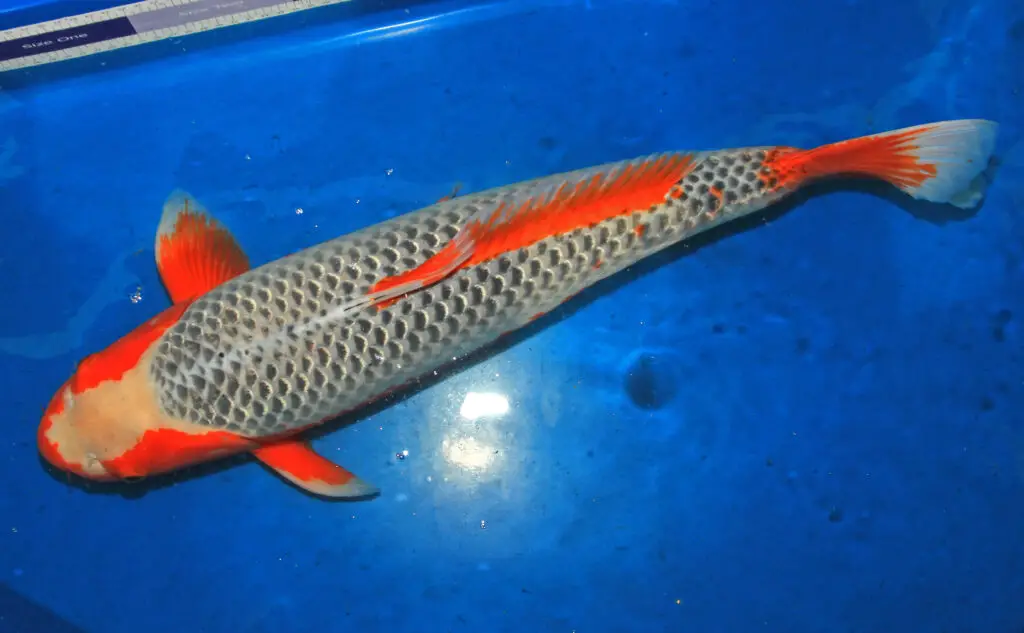
Koi Have Facial Barbels
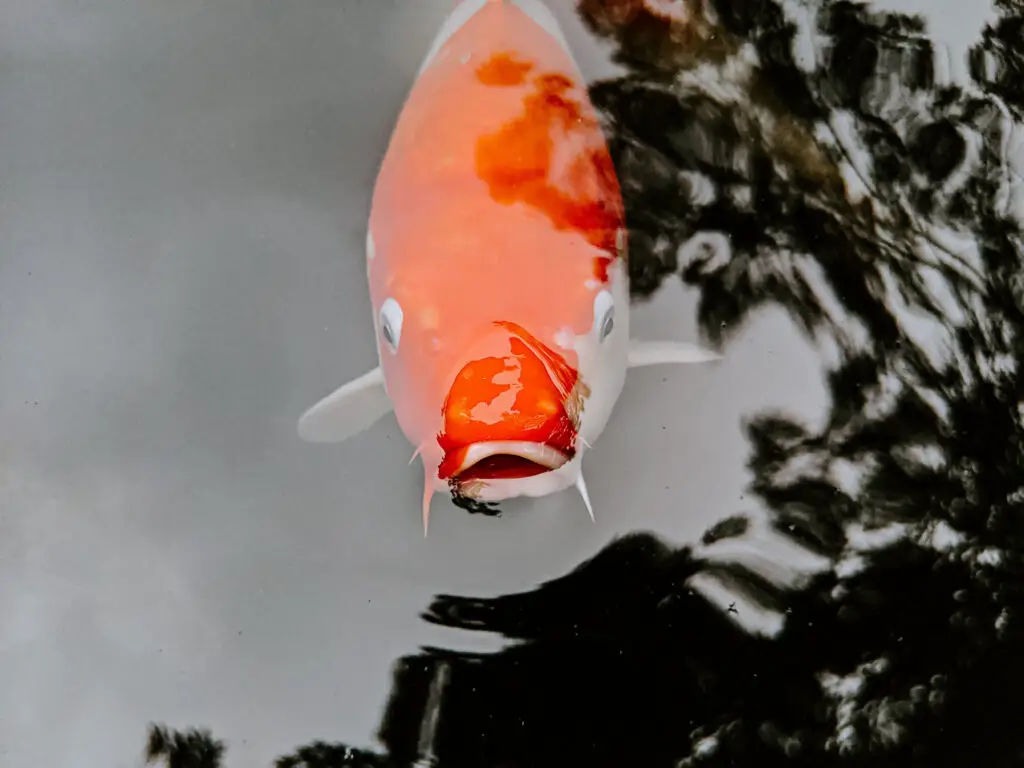
Even when they are young, the most effective way to differentiate between a koi and a goldfish is to look for the presence of barbels. Barbels, or whiskers as they are sometimes called, are only found on koi and never on goldfish. The whisker-type protrusions are located on either side of the mouth.
The barbels are sensitive sensory organs that assist the koi in finding food in cloudy or murky water where they cannot physically see the food.
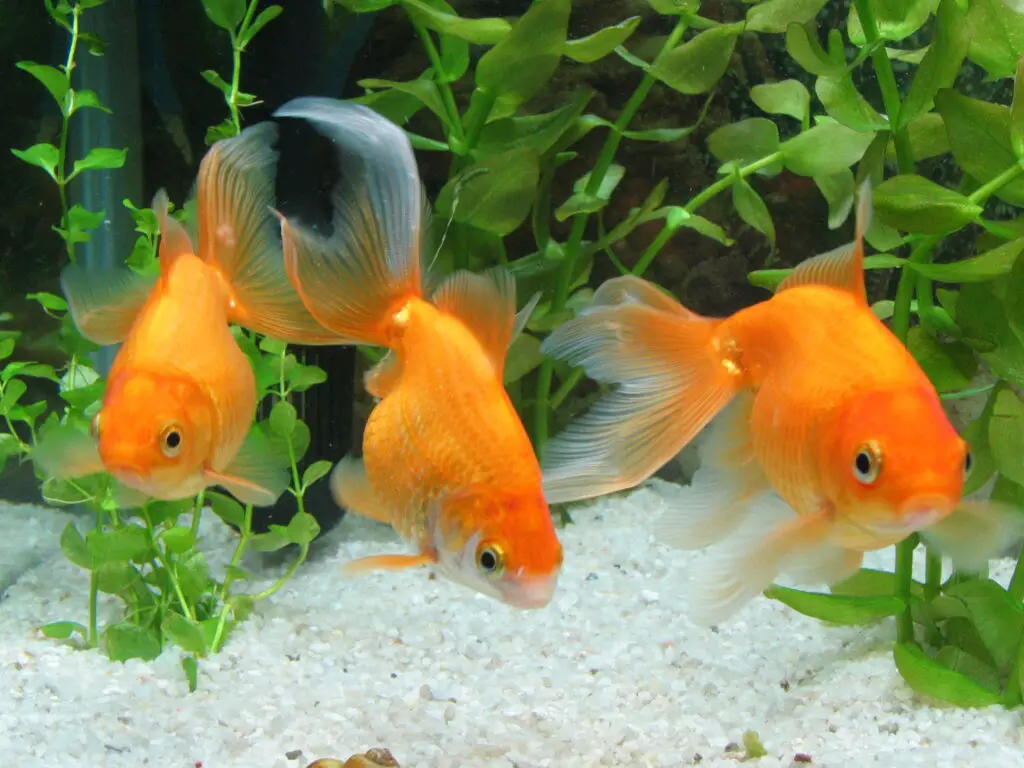
Mouth Shape Differences Between Koi And Goldfish
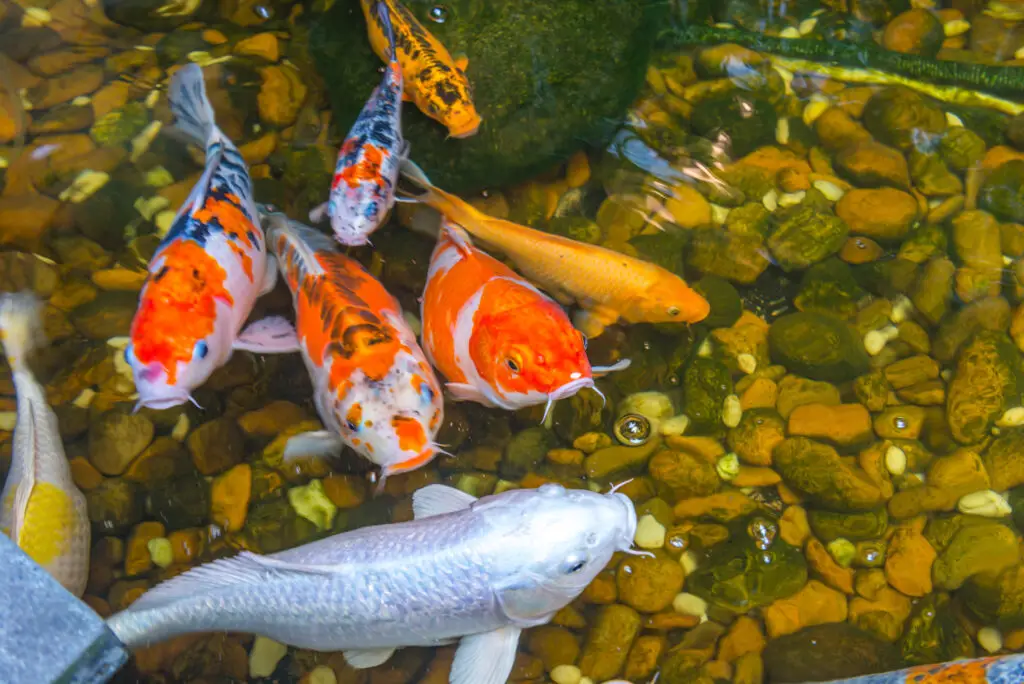
In conjunction with the barbels, the shape of the mouth assists in differentiating between a goldfish and a koi. When koi and goldfish rise to the surface to feed, look at the shape of the mouth when facing the fish head-on.
Goldfish have a round or circular-shaped bottom lip, easily seen when the mouth is open. Koi are naturally bottom feeders and forage along the bottom of the pond; as such, the bottom lip is very flat in shape. Goldfish swim around in the aquarium, waiting for the next fish food flakes to drop into the tank, and don’t forage continually like koi.
You’ve got a koi if you see a flat bottom lip with barbels attached to either end. When the mouth is open, a round-shaped bottom lip and the absence of barbels tell you it’s a goldfish.
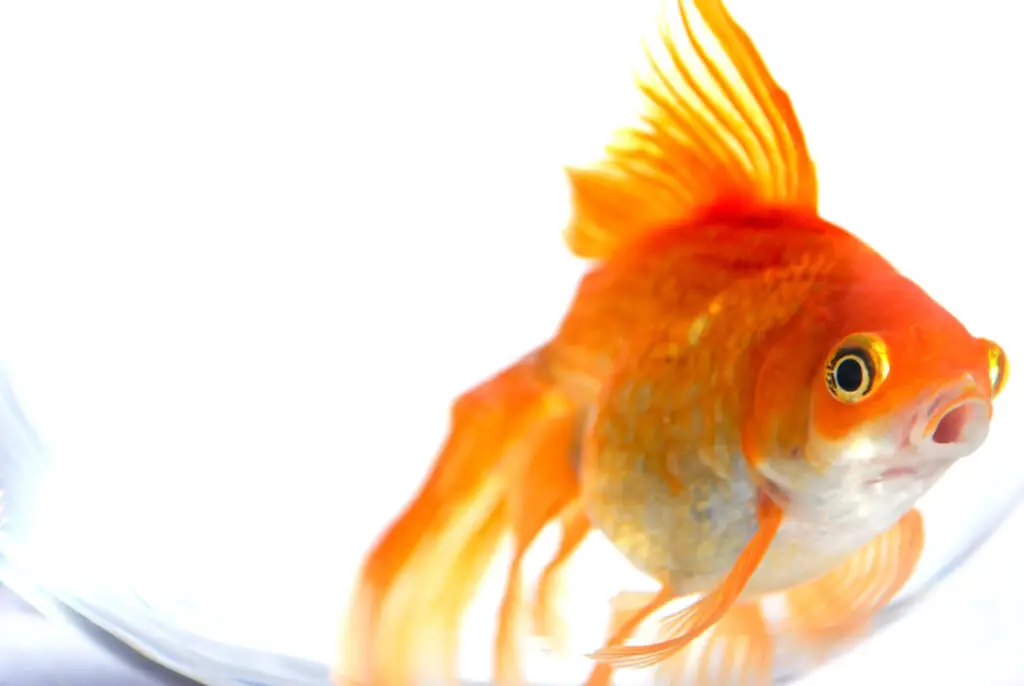
Koi Versus Goldfish Digestive Tract
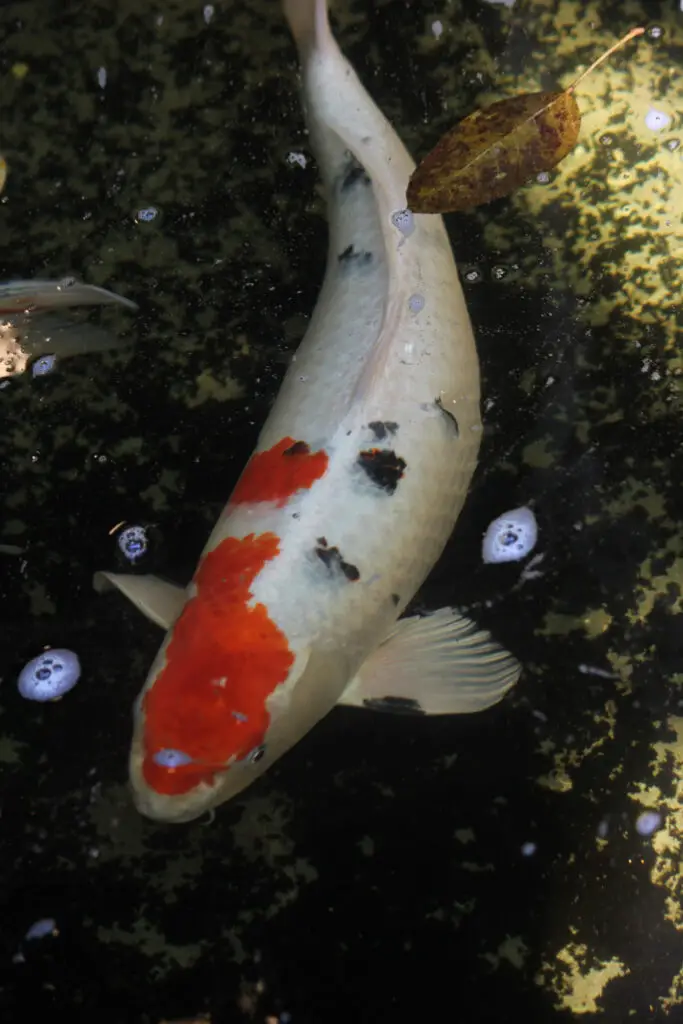
An interesting difference in the digestive systems between koi and goldfish is that koi do not have a stomach. This observation won’t assist in visual identification, but it is a notable difference between the two species and is an interesting fact to share with friends.
When koi feed, the food passes directly into the intestines, where it is digested. Goldfish have a stomach where the food is collected and slowly passed into the intestines for further digestion.
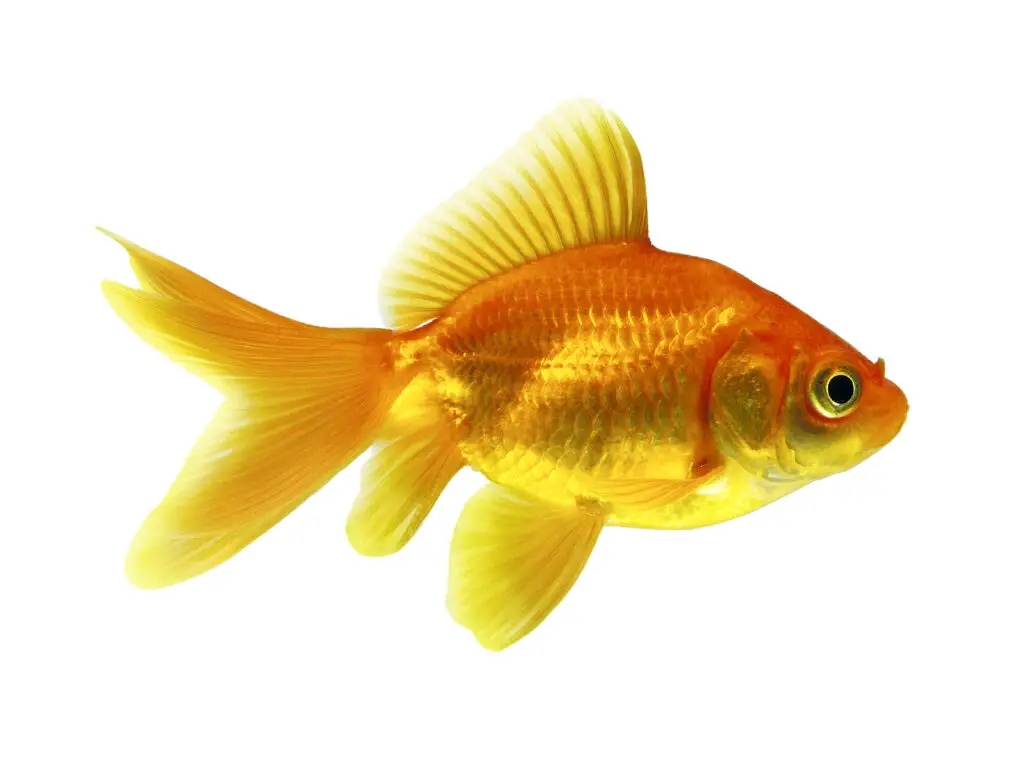
Koi And Goldfish Life Expectancy
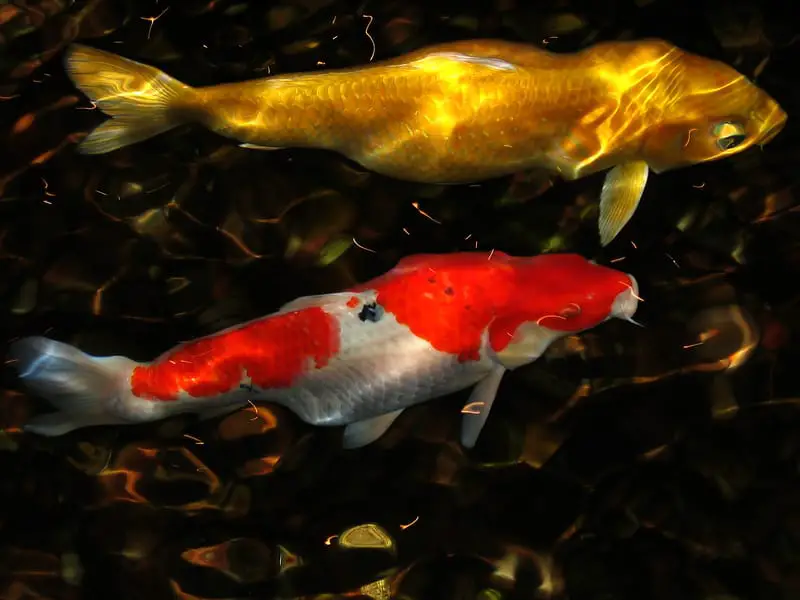
Koi are magnificent fish in terms of longevity. On average, koi live to around thirty-five years old, but they can live up to one hundred years of age in ideal circumstances. Astoundingly the oldest recorded koi lived to two hundred and twenty-six years old. This remarkable female koi was named Hanako, hatched in 1751, and died in 1977.
Koi usually live in garden ponds and are physically stronger and, of course, larger than goldfish.
Goldfish are well adapted to survival in aquariums and indoor ponds but are physically more fragile than koi. Goldfish live up to about fifteen years of age under ideal circumstances. Amazingly the oldest goldfish ever recorded was a common goldfish named Goldie that lived for forty-five years.

Koi and Goldfish Color Variations
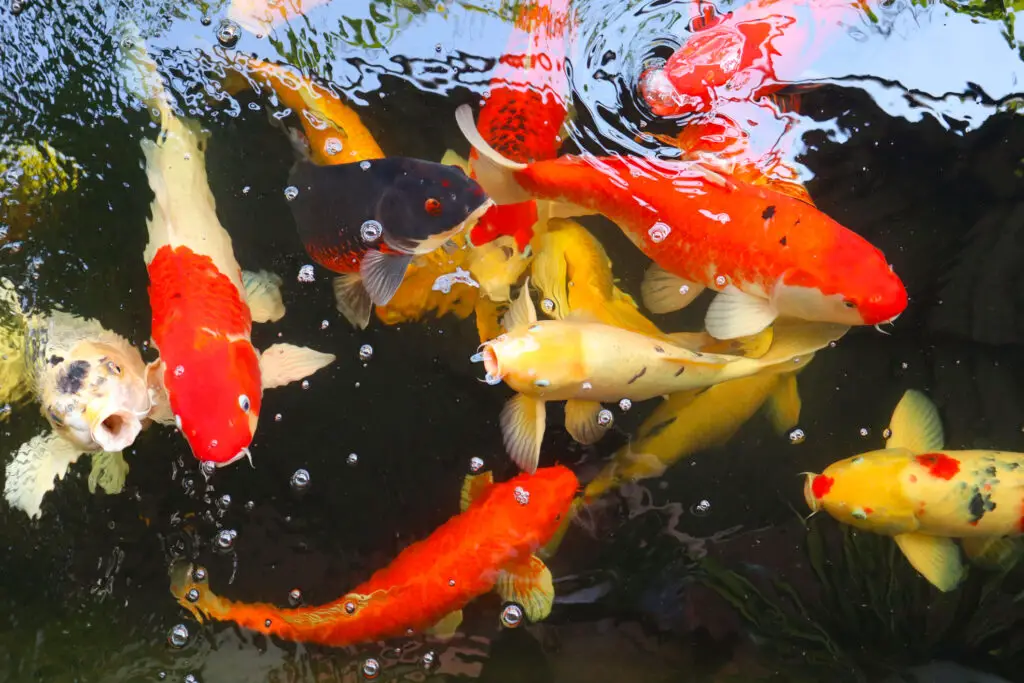
Koi are bred for their vibrant color, including red, deep orange, silver, yellow, black, blue, and cream. Over twenty different varieties of koi are recognized, with each having its distinct and unique color patterns.
Goldfish, like koi, are bred in a vast array of colors. In total, nearly two hundred varieties of goldfish are recognized. The vibrant colors of koi and goldfish are the single primary attribute to the popularity of these fish species as pets.
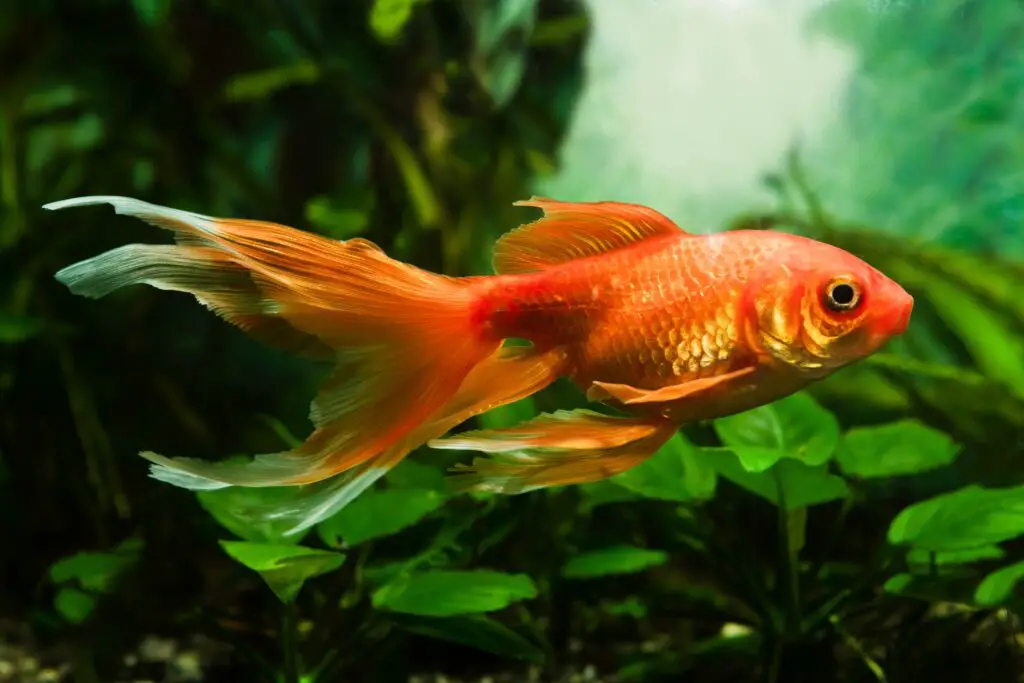
Aquarium Or Pond? Which Is Better For Koi And Goldfish?
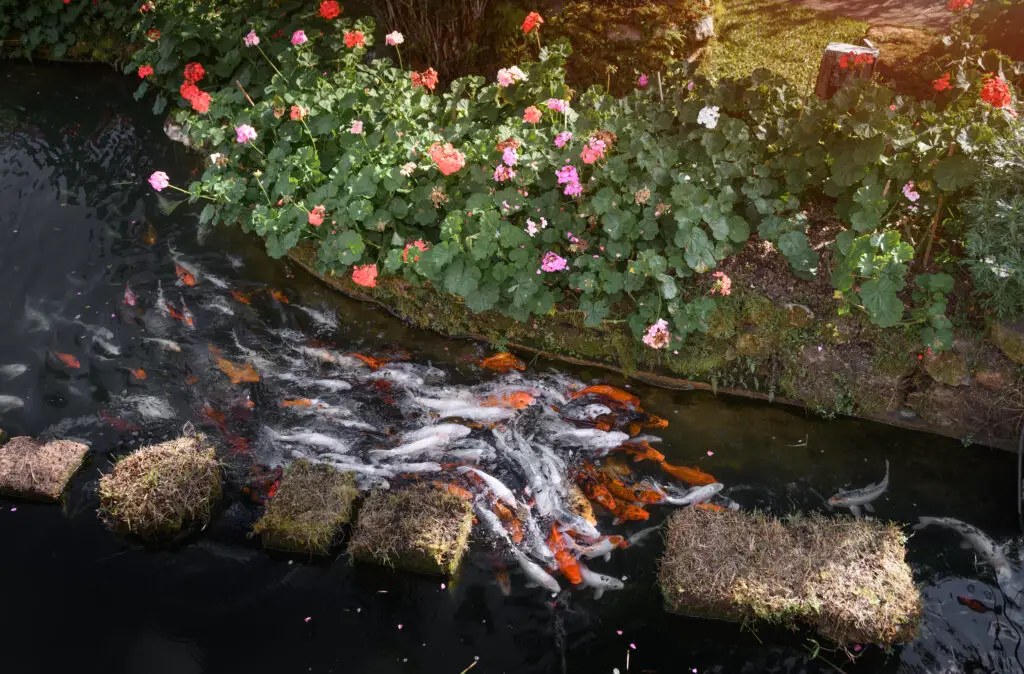
Koi, descendants of the wild Amur Carp, are well adapted to life in outdoor ponds. The physical size of adult koi, which can be up to three feet more, makes it impractical to keep them in traditional indoor aquariums.
Goldfish can and are kept in garden ponds but are more susceptible to predators due to their smaller size, and they are less tolerant of the cold than koi. Goldfish are better suited to aquarium life, where the water quality and temperature can be carefully monitored.
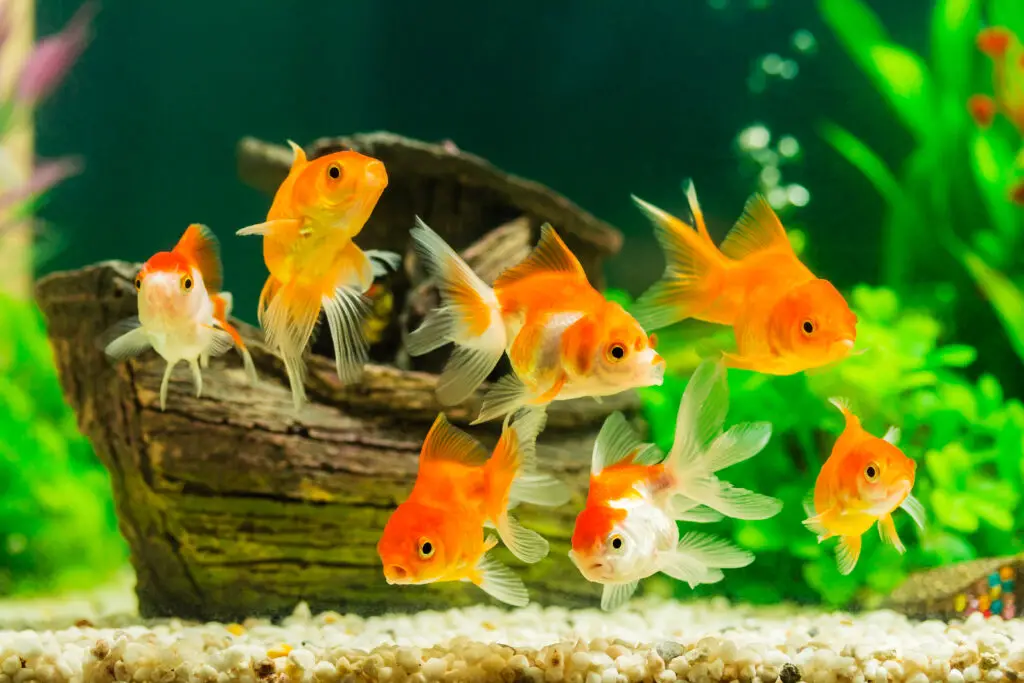
Goldfish are more susceptible to disease than koi and, thus, are more prone to illness and stress. For this reason, they tend to have shorter lifespans when kept in garden ponds.
Koi and goldfish are often kept together in the same pond; however, koi are more confident than goldfish, so they tend to snap up available food before the goldfish. Koi sometimes even eat smaller goldfish while feeding enthusiastically.
This bold feeding behavior is why koi pellets consist of both floating and sinking pellets. The composition of the pellets ensures an even distribution of the food evenly in the water column, increasing the probability of all the ponds inhabitants receiving food.
In deeper ponds where Goldfish and Koi coexist, the goldfish are generally less visible than the Koi because Koi are larger than goldfish, and because goldfish are shyer than koi, the goldfish spend much of their time hiding. Goldfish are far more visible in aquariums due to the limited hiding space.
When building or purchasing your pond or aquarium, plan with the end in mind. If you want to keep koi fish and goldfish, make sure that the pond or tank is large enough to accommodate the mature koi and keep the goldfish safe. The recommended pond capacity is five hundred and thousand gallons per adult koi, and goldfish need a minimum of twenty gallons per fish. Small goldfish bowls are not suitable for keeping goldfish or koi.
Can Koi Mate With Goldfish
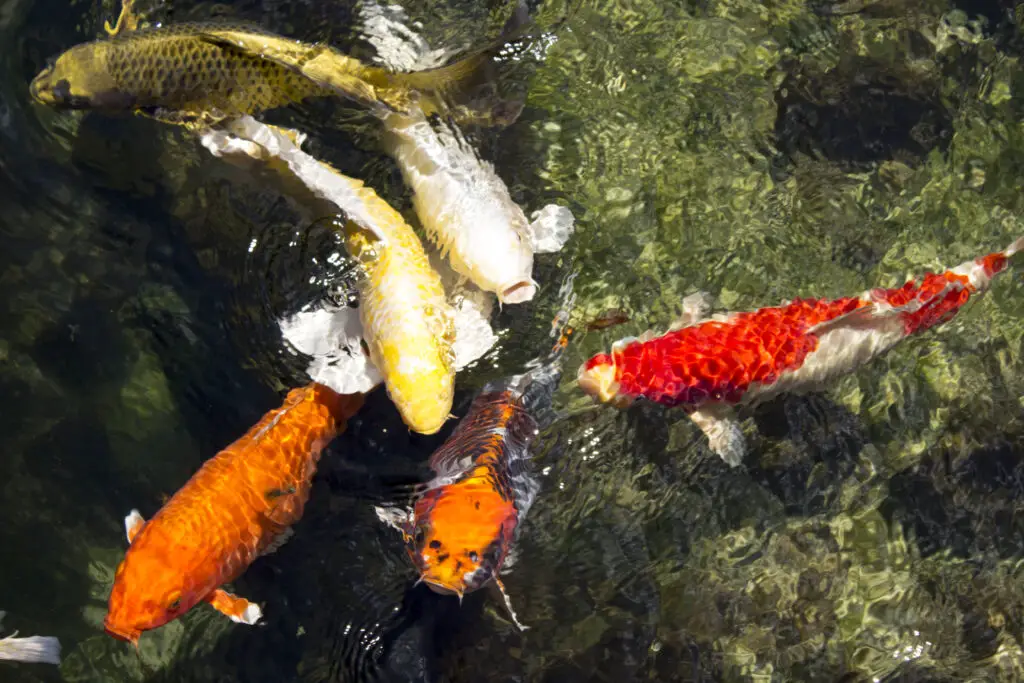
Koi and goldfish originate from carp species. In ponds where koi and goldfish coexist, the two can interbreed. The offspring are referred to as koimets.
Like other hybrids, such as mules that are a crossbreed between a horse and donkey, koimets are infertile and may exhibit physical characteristics from both parents.
In a pond setting, koi and goldfish spawn in groups, meaning the females will deposit the eggs on the pond floor, and the males will fertilize the eggs. A couple of days later, the eggs will hatch into tiny fish, known as fry.
Although koimets can be interesting hybrids, dedicated breeders will never keep koi and goldfish in the same pond or aquarium. Here are some physical characteristics that you can expect if a koi mates with a goldfish to produce koimets.
- Small or absent barbels
- Size. the koimet will be smaller than a koi but bigger than a goldfish
- Fins – rounder shape than a goldfish
- Sterile – unable to reproduce
- Scales – Koimets have more scales along their lateral line than goldfish, but it is fewer than a koi.
- Tail – Usually resembles a single-tail goldfish.
- Sensory nubs – may display small white dots over eyes and nostrils.
Despite the long lifespans of koi, females only breed once a year in spring for six to seven years after reaching maturity. Should the environment be perfect, it is known that some koi will spawn twice in one season but usually produce significantly fewer eggs during the second spawn.
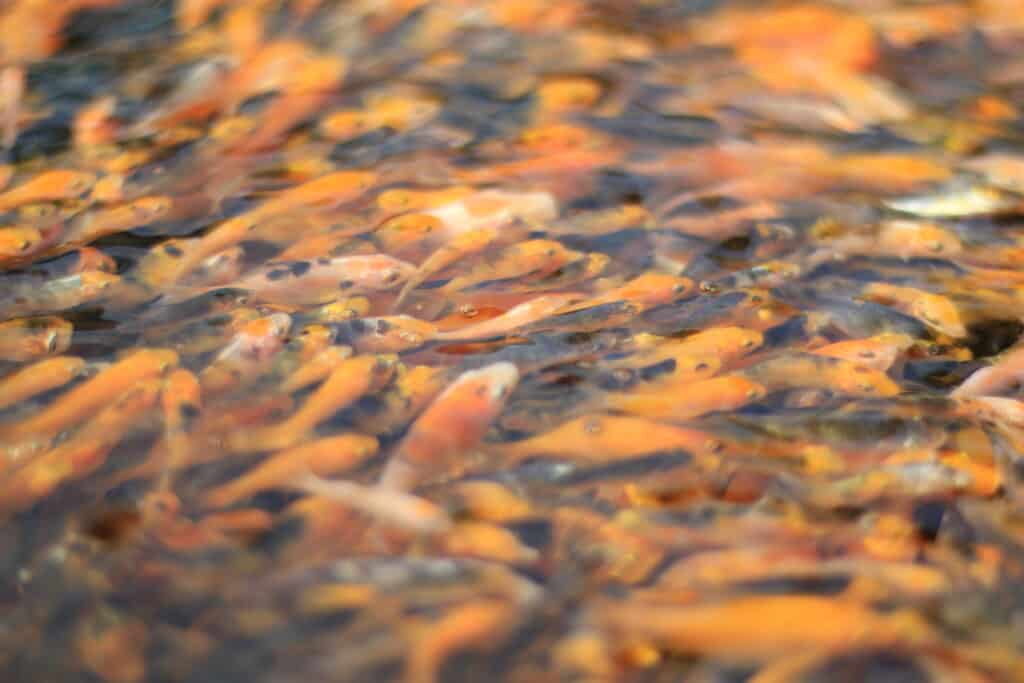
Goldfish mature at the age of three and spawn monthly between April and August when the weather is warm. Neither goldfish nor koi have any maternal instinct and are known to eat their eggs and small baby fish if they’re not separated. The mortality rate is very high in both species, meaning only a few of the eggs laid will mature.
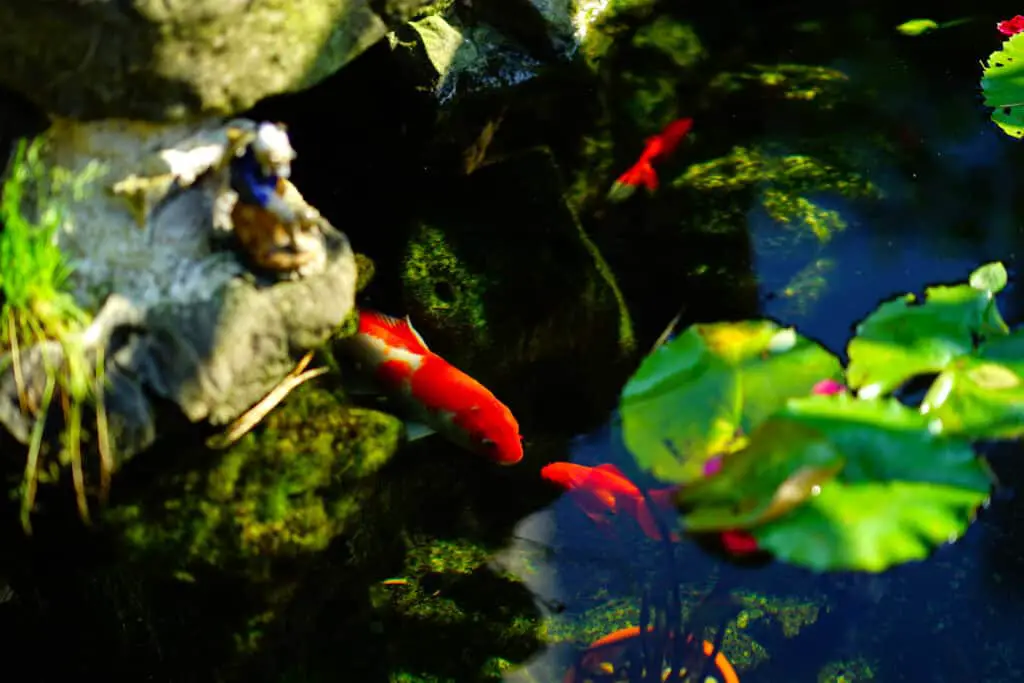
Do Koi And Goldfish Eat Aquatic Plants?
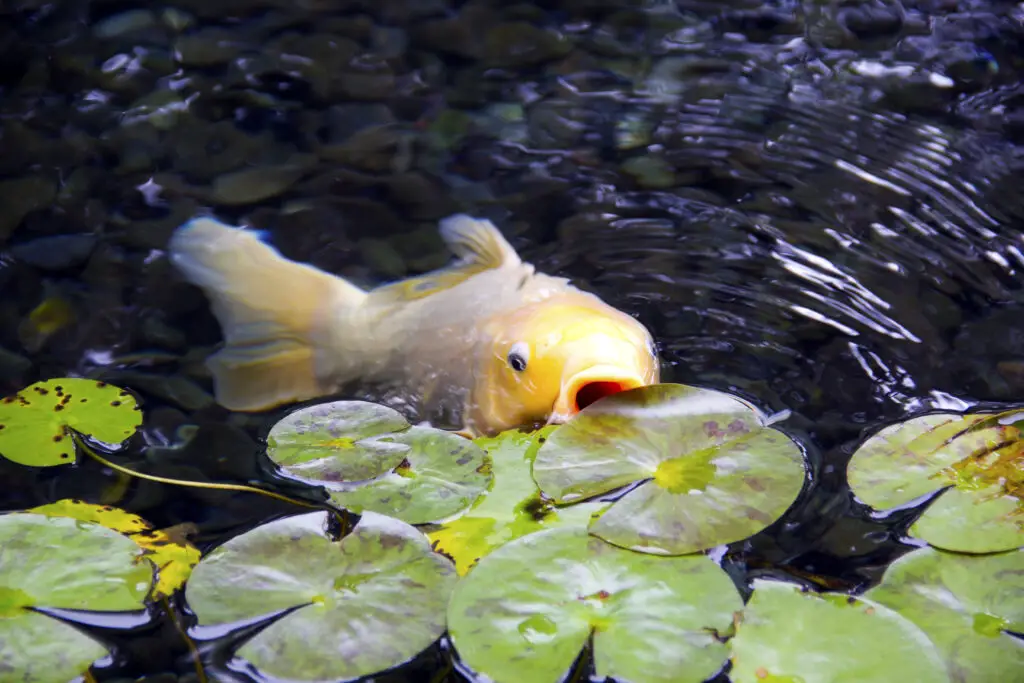
Both Koi and Goldfish are omnivorous feeders, so they eat protein-rich foods such as insects and plant material.
When adding plants to your koi pond, choose the right plants, as both koi and goldfish will eat common aquatic plants even when they receive ample food. A variety of resilient aquatic plants are available that are well suited to ponds where these fish are kept. In addition, some innovative planting methods have been created to keep the plants safe from being eaten.
Plants are an essential part of a pond as they serve as an additional food source for hungry goldfish or koi and provide hiding places from predators. Choose a wide variety of fast-growing plants to keep up with hungry fish in the pond. Hatchlings would quickly become a tasty snack without enough plants to shelter between.
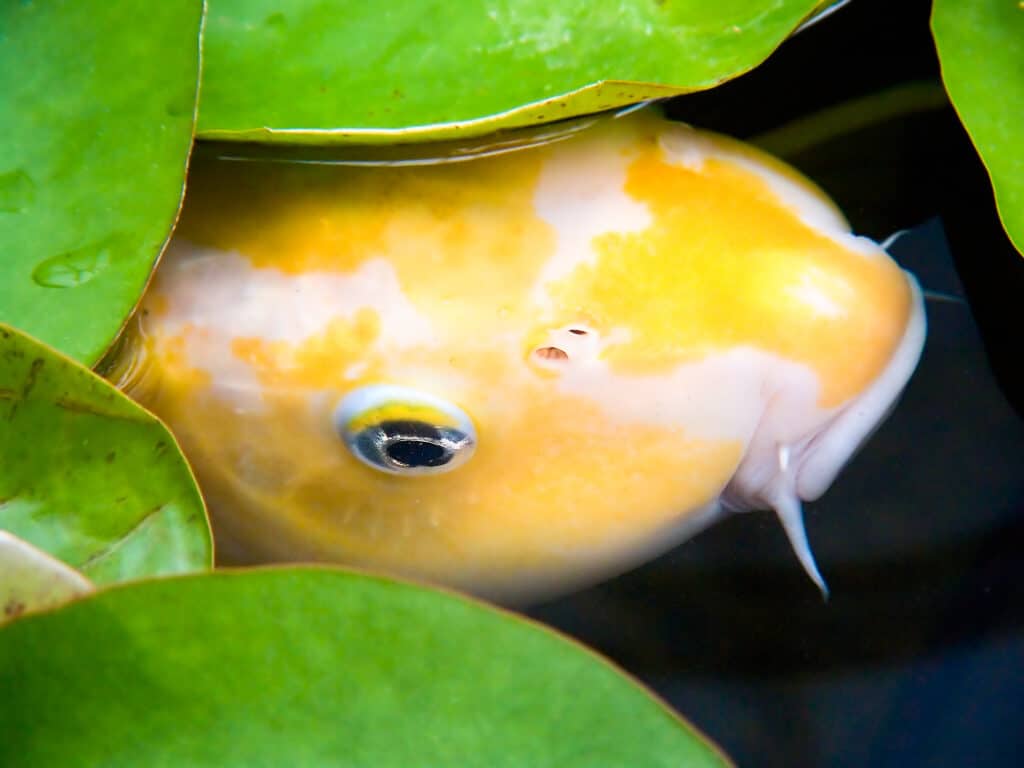
Do Koi And Goldfish Look The Same?
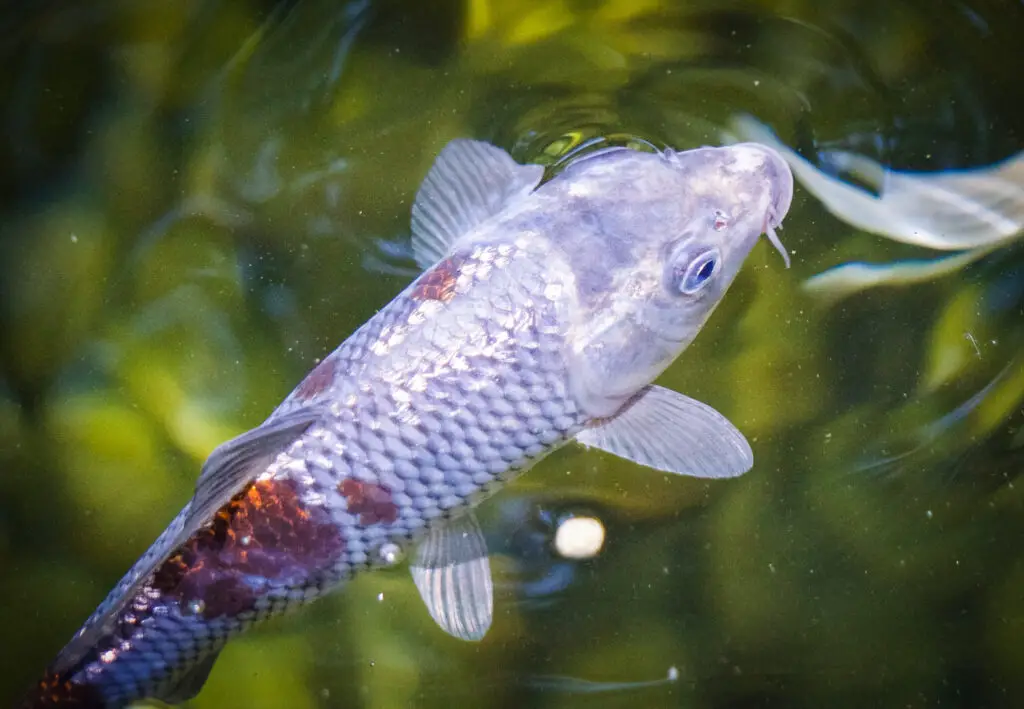
Some goldfish varieties exist that look very similar to koi and share the slim body shape and small-fin trait. As a rule, koi have very slender bodies without decorative fins and tails. So at a glance, the two fish can look very similar.
In terms of coloration, koi tend to be more colorful, with a metallic shine to their scales. Goldfish often have fewer colors than koi. As fish age, the differences will become more apparent as a koi will quickly outgrow a goldfish.
In instances where the fish look very alike, refer back to the basics, such as the dorsal fin configuration, barbels in the corners of the mouth, and the shape of the bottom lip. These characteristics will assist in distinguishing between the fish in question.
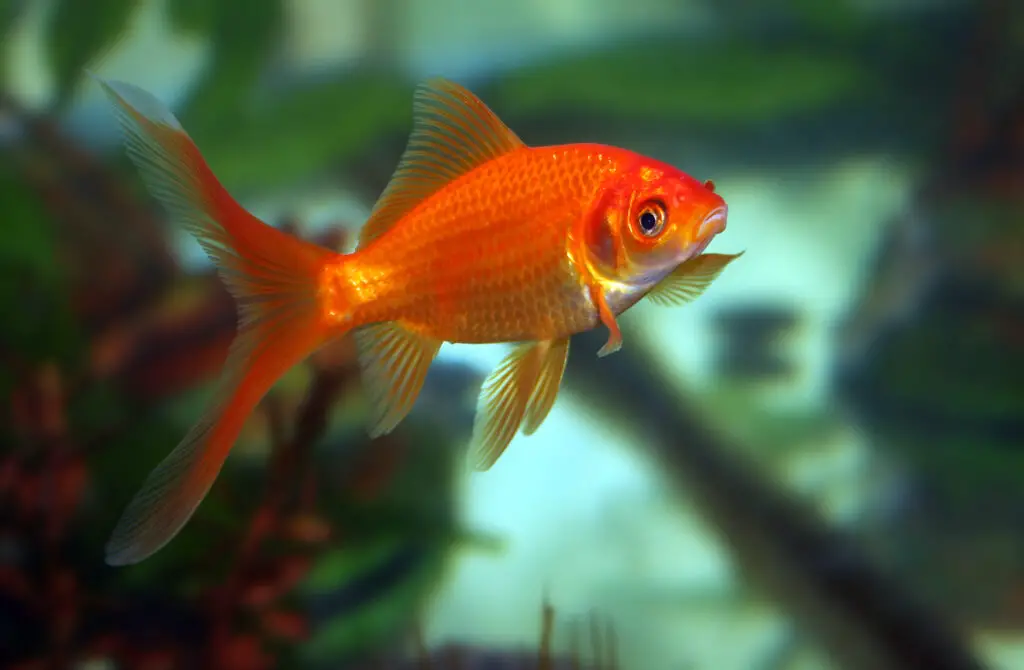
Conclusion
Koi and goldfish are highly valued as ornamental fish species adorning aquariums and ponds. The main differences between koi and goldfish are their body shapes and size in their mature form. Koi have a flat-shaped bottom lip, a goldfish’s lip is round, and lastly, a koi’s dorsal fin and tail are joined, whereas goldfish have a distinct gap between the dorsal fin and tail. Koi possess barbels on the corner of their mouth that are not present in goldfish.
References
https://www.petmd.com/fish/care/evr_fi_facts-about-koi-fish
https://www.petmd.com/search?keys=facts+aboiut+goldfish
https://en.wikipedia.org/wiki/Eurasian_carp
https://pethelpful.com/fish-aquariums/The-Best-Aquatic-Plants-for-Goldfish https://animals.mom.com/difference-koi-vs-goldfish-4966.html
